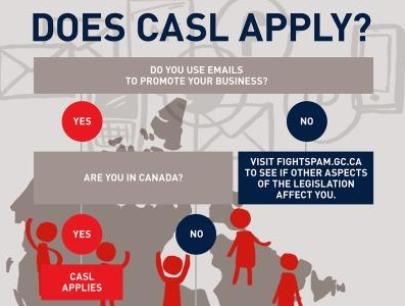
Checked your email this morning? There’s a bunch of spam in there, right? There ought to be a law.
On July 1, Canada’s new anti-spam law comes into effect. If you were unaware of this fact and were gearing up for an ongoing email marketing campaign, you may want to read the law first, as lots of things that it is possible for marketers to get away with now will become illegal on the 1st of July.
Aside from being annoying, marketing spam is also a prime vehicle for malware and identity theft.
In an inspired bit of marketing savvy, Montreal-based email marketing firm Cakemail has published a quick-and-dirty PDF that details the ins and outs of the new legislation. Nothing promotes the integrity of a company that specializes in email marketing more than saying, “Look, we’re not only one of the good guys, but also we’ll help you interpret this law.” Also, they’ve read the law so you don’t have to, and have served it up as an easy-to-scan infographic.
The key issue to be understood in the new law revolves around the idea of “consent”, and its two varieties: “express” and “implied” consent. Express consent is someone actively saying, “Yes, I want you to send me these emails.”
Implied consent needs an existing relationship in which the recipient hasn’t expressly agreed to receive a communication from you but has opened the door a crack, such as if they’ve purchased something or if they’ve downloaded a trial version of your software or given you a business card at a trade show, for example.
In order to upgrade that business card relationship from “implied” to “express” consent status, though, it will be the sender’s responsibility to send a confirmation email asking, “Is it all right if I start sending you marketing emails?” in order to stay legally clean.
You must also always provide an “unsubscribe” opt-out in every subsequent email sent.
Bottom line, if called upon by the authorities, “you need to be able to provide proof of opt-in for every address on your list.”
Wondering whether or not this applies to you? If you’re in Canada, then it most likely does. The law specifies that if an email originates in Canada or is read in Canada, then the anti-spam law applies.
Your recourse if you continue to receive unsolicited marketing emails? The law will be enforced by the CRTC. You can report spam, as of July 1st, to http://fightspam.gc.ca. Thanks again to Cakemail for the infographic below.
_______________________________________________________________________________________________________________
Comment
One thought on “Are you breaking Canada’s new anti-spam law? Find out in 30 seconds”
Leave a Reply
You must be logged in to post a comment.



 Share
Share Tweet
Tweet Share
Share




Savage Canadians who label the seal massacre nightmare its government propaganda euphemism “hunt” are complicit in supporting an unimaginable atrocity Canada’s annual mass murder campaign of seal pups horrifies anyone who has any sense of decency or morality. This is literally no different than the atrocities committed in the concentration camps and that is an accurate comparison. Canada’s reputation is in the sewer because of this barbaric bloodbath atrocity led by the Harper criminal and his groveling sadistic Gail Shea “fisheries minister”.
Harper is globally recognized as a dangerously corrupt political leader and is universally condemned by the global community. Harper uses extortion, threats and bribes to peddle his dirtiest oil on earth tar sands.. which has devastated once pristine Alberta ecosystems and wilderness and their native inhabitants.. along with many other of his cronies’ projects which harm environments worldwide. He has sabotaged climate talks, he blocks laws for animal cruelty and endangered species protection, he promotes horrific wildlife massacre bloodbaths, such as the harp seal pup bloodbaths (ignoring the entire world which has banned and boycotted Canada for that atrocity) and many other less publicized ones like elk massacres and endangered polar bear trophy hunts. he indulges in massive land and air pollution across Canada and clearcutting of old growth. Along with his crushing of laws upholding human rights, and his arms peddlng and warmongering, Harper has shown he’s simply a threat to the public and must be removed from public office